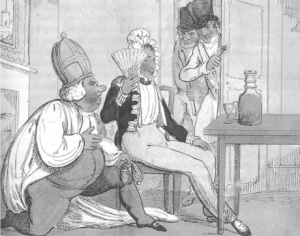“Gay Men and Violence against Women in Mark Ravenhill’s ‘Mother Clap’s Molly House’”
Conclusion
Ravenhill’s characters are negligent when it comes to protecting and advocating for the vulnerable women in Mother Clap, and the playwright uses their empty responses to these acts of violence to critique the twenty-first century gay male subject. It is important to note, however, that to characterize his male subjects as hedonistic, selfish, and irresponsible, Ravenhill opts to objectify the female body. He paints the male subject as weak, but to do so, he creates another, even weaker body—the victim of an act of violation—with which he then compares his ineffectual male subjects. For Mark Ravenhill, gay identity politics is the answer to none of society’s problems. On the contrary, Ravenhill’s gay male characters exemplify antipolitical contemporary culture in all of its excesses and grotesqueries. This callousness is most evident in Mother Clap when Ravenhill juxtaposes gay culture with an injured female body.
Twenty years ago, in her seminal study Between Men, Sedgwick stressed that “profound and intuitable as the bonds between feminism and antihomophobia often are in our society, the two forces are not the same. As the alliance between them is not automatic or transhistorical, it will be most helpful if it is analytic and unpresuming”. Mother Clap points to this disconnect in contemporary gay culture between antihomophobic discourse and feminism. As Ravenhill says in British Theatre of the 1990s, “having spending power makes you mainstream, not marginalized”.
Ravenhill’s project in these plays is unquestionably a critique of the mainstream gay movement—a movement that unsurprisingly benefits, more than anyone else, middle-class white men. In Mother Clap’s Molly House, homonormative gay culture appears unstoppable. It has become so much a part of mainstream society, that it has begun to create its own margins, ignoring violence against women in favor of a bigger place at the table for white gay men. But if, for Ravenhill, mainstream gay culture is not only a product of but a bellwether for neoliberal culture considered more broadly, the playwright’s critiques of homonormativity and consumerism are much more biting than they appear at first glance.
In other words, gay men and lesbians aren’t the only people obsessed with shopping and fucking.



